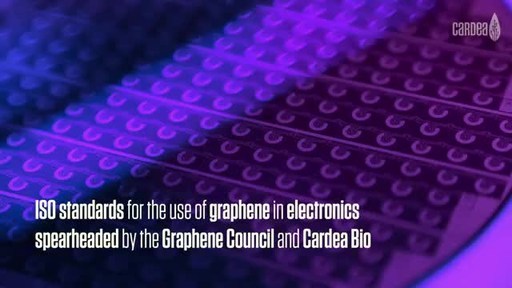ISO standards for the use of graphene in electronics spearheaded by the Graphene Council and Cardea Bio
SAN DIEGO, Aug. 18, 2022 /PRNewswire/ -- Today the Graphene Council and Cardea published an interview of their work on defining the standards for using graphene in electronics and biosensors, as well as Cardea's journey to ensure their quality control to achieve reproducibility and high quality in the production of their BPUs (Biosignal Processing Units).
"How do you do electronics with graphene? How should that be approached from a standardization point of view? Specifically, what should the standards be around an electronics grade mono-layer CVD (Chemical Vapor Deposition) graphene?" asks Brett Goldsmith, PhD, Chief Technology Officer at Cardea, and continues, "Graphene has phenomenal properties as biosensors, meaning that graphene is going to change the world and how we interact with biology as human beings. But making graphene work reliably is much harder than I think a lot of us understood in the beginning. Standards are important for that and what the Graphene Council is doing, is important for that."
The Graphene Council is the largest community in the world for graphene researchers, academics, producers, developers, investors, nanotechnologists, regulatory agencies, research institutes, and material science specialists. The Graphene Council is a member of the ISO/ANSI TC 229 Nanotechnology Standards Development Group and the IEC TC 113, Nano-Electrotechnologies Technical Committee.
Executive Director at the Graphene Council, Terrance Barkan, adds "On the standards side, Cardea has been a huge help for us in understanding the needs for this particular type of graphene for electronics. Cardea has gone several steps further to target what graphene can do with its amazing properties to solve really significant problems. Personally, I can't think of many areas more meaningful than human health and diagnostics."
Dr. Goldsmith continues, "This year has seen a maturation of the conversation in relation to the industry and graphene standards and in working on the standards side, I've been super impressed with the Graphene Council. As an industry it's great to see us mature like this and really take the end-product focus-point of view on what we're doing. The standard will likely become a bit more complicated when it's going to be used in a biosensor for medicine, but the philosophy is the same: Get all the way through your application, through to the end-customer, before you think you know your input material!"
The entire interview is freely available here.
About Cardea Bio
Cardea Bio is the world's only mass producer of a biocompatible semiconductor, the BPU™ (Biosignal Processing Unit) Platform. The BPU is the first and only semiconductor capable of translating real-time streams of multiomics signals into digital information. Through the BPU™ platform, Cardea's long-term vision is to democratize access to the biosignals and insights behind the most advanced technology on our planet: Nature and biology. The Internet of Biology is that way becoming possible.
Cardea's rapidly expanding IP portfolio now has 33 broad patents issued and another 34 patents pending, cementing Cardea's market-leader position in the graphene biosensor industry, where they are bringing the BPU™ (Biosignal Processing Unit) Platform to market.
Cardea is headquartered in San Diego and has additional activity in Los Angeles. Cardea is a 100% American developed and built biocompatible semiconductor graphene biosensor platform for applications across a variety of sectors including human health, agriculture, molecular diagnostics, biotechnology, environmental monitoring, and animal health.
Contact the Graphene Council
Terrance Barkan
Phone: +1 202-294-5563
[email protected]
Contact Cardea
Lasse Görlitz, VP of Communications
US phone: +1 858 319 7135
EU phone: +45 2758 2601
[email protected]
SOURCE Cardea Bio

WANT YOUR COMPANY'S NEWS FEATURED ON PRNEWSWIRE.COM?
Newsrooms &
Influencers
Digital Media
Outlets
Journalists
Opted In

Share this article